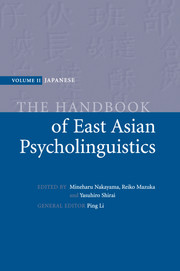Book contents
- Frontmatter
- Contents
- List of figures
- List of contributors
- In memory of Miwa Nishimura
- Preface
- Introduction
- Language acquisition
- 1 Ontogeny of language
- 2 Caregivers' speech
- 3 The intrinsic link between gesture and speech at the prelinguistic stage
- 4 Infant speech perception
- 5 Phonological acquisition
- 6 The mechanism of lexical development: implications from Japanese children's word learning
- 7 The acquisition of nouns and verbs in Japanese
- 8 The acquisition of verbal nouns
- 9 The acquisition of Japanese numeral classifiers
- 10 The acquisition of case markers
- 11 The acquisition of tense and aspect
- 12 On the origin of children's errors: the case of Japanese negation and direct passive
- 13 Binding Theory in UG and first-language acquisition of Japanese
- 14 The acquisition of the particles ne, yo, and no
- 15 The acquisition of linguistic politeness in Japanese
- 16 Children's narrative structures
- 17 Memory talk and testimony in children
- 18 Developmental dyslexia
- 19 Japanese Sign Language
- 20 The role of an innate acquisition device in second-language acquisition
- 21 Japanese, the grammar of reflexives, and second-language acquisition
- 22 Processes in L2 Japanese sentence production
- 23 The development of lexical competence among second-language readers
- 24 Reading in Japanese as a second language
- 25 Intrasentential code-switching in Japanese and English
- Part II Language processing
- References
- Name index
- Subject index
23 - The development of lexical competence among second-language readers
from Language acquisition
Published online by Cambridge University Press: 05 June 2012
- Frontmatter
- Contents
- List of figures
- List of contributors
- In memory of Miwa Nishimura
- Preface
- Introduction
- Language acquisition
- 1 Ontogeny of language
- 2 Caregivers' speech
- 3 The intrinsic link between gesture and speech at the prelinguistic stage
- 4 Infant speech perception
- 5 Phonological acquisition
- 6 The mechanism of lexical development: implications from Japanese children's word learning
- 7 The acquisition of nouns and verbs in Japanese
- 8 The acquisition of verbal nouns
- 9 The acquisition of Japanese numeral classifiers
- 10 The acquisition of case markers
- 11 The acquisition of tense and aspect
- 12 On the origin of children's errors: the case of Japanese negation and direct passive
- 13 Binding Theory in UG and first-language acquisition of Japanese
- 14 The acquisition of the particles ne, yo, and no
- 15 The acquisition of linguistic politeness in Japanese
- 16 Children's narrative structures
- 17 Memory talk and testimony in children
- 18 Developmental dyslexia
- 19 Japanese Sign Language
- 20 The role of an innate acquisition device in second-language acquisition
- 21 Japanese, the grammar of reflexives, and second-language acquisition
- 22 Processes in L2 Japanese sentence production
- 23 The development of lexical competence among second-language readers
- 24 Reading in Japanese as a second language
- 25 Intrasentential code-switching in Japanese and English
- Part II Language processing
- References
- Name index
- Subject index
Summary
Second-language processing is unique in that virtually all aspects of its operation are crosslinguistic, involving two or more languages. The intent of this chapter is to explore the crosslinguistic nature of second-language processing, and in so doing, illuminate principled approaches to analyzing lexical competence among adult second-language learners. In this context, lexical competence refers to the range of capabilities directly contributing to the extraction of linguistic information coded in visual word displays. Previous research suggests that such capabilities evolve progressively through cumulative processing experience with target-language visual input (Perfetti et al., 1987). As a consequence, they vary systematically across languages in accordance with the manner in which lexical information is represented by graphic symbols in the writing system (Nagy & Anderson, 1999; Koda, 2002). Importantly, once developed in one language, these capabilities readily transfer to another language, and further mature through print processing experience in that language (Akamatsu, 1999; Koda, 1999, 2000). Thus, second-language lexical-competence development can be characterized as an amalgamated process emerging from crosslinguistic interactions between transferred first-language procedures and second-language visual input. Structural variations in first-language writing systems, presumably, are a major aspect of individual differences in lexical processing behaviors among second-language learners. Methodical investigations of such variance, consequently, should offer useful clues to understanding second-language lexical competence development. In this regard, it should be noted that the term “competence” is used inclusively in this chapter with reference to linguistic knowledge, processing skills, and cognitive abilities.
- Type
- Chapter
- Information
- The Handbook of East Asian Psycholinguistics , pp. 165 - 172Publisher: Cambridge University PressPrint publication year: 2006



